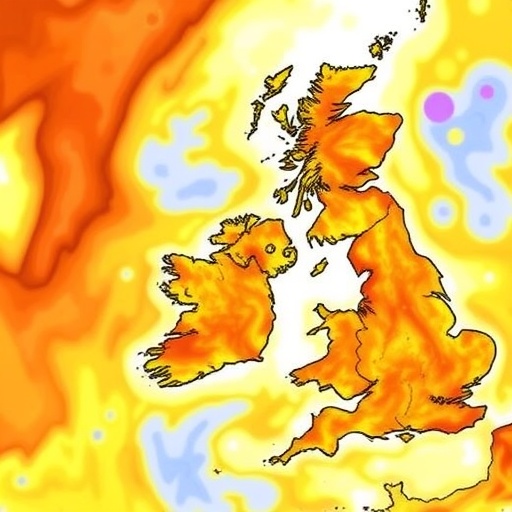In a landmark study published in the esteemed journal Weather, researchers from the Met Office Hadley Centre have unveiled a striking evolution in the appraisal of extreme summer temperatures across the United Kingdom. Leveraging state-of-the-art climate modeling techniques and decades of historical meteorological data, the team has quantitatively elucidated a dramatic increase in both the magnitude and likelihood of record-breaking heat episodes. Their analysis reveals that temperatures significantly surpassing those observed during the July 2022 UK heatwave are now well within the realm of plausibility in the contemporary climate regime, with model simulations indicating potential maximums exceeding 45°C (113°F).
The study employed a comprehensive ensemble of climate scenarios to capture the multifaceted pathways through which summer temperatures may develop under ongoing climate change influences. The researchers contextualize these findings by contrasting current probabilities with baseline metrics from the 1960s, demonstrating that the occurrence of temperatures reaching 40°C (104°F) has surged to over twentyfold greater likelihood. Crucially, this heightened probability is not static; projections suggest it will ascend further in concert with global warming trends, underscoring a trajectory toward increasingly perilous summer heat extremes in coming decades.
Breaking new ground in the understanding of prolonged heatwave phenomena, the investigation delves into the duration and persistence of elevated temperature events. Through sophisticated storyline analyses, it becomes evident that protracted heatwaves—defined by sustained periods exceeding a month with temperatures above 28°C (82°F)—are no longer hypothetical. Specifically, such extreme thermal episodes are demonstrably feasible in southeastern England under current climatic conditions, presenting significant implications for infrastructure resilience, public health, and ecological balance.
The modeling framework underpinning this research integrates high-resolution regional climate simulations with emergent dynamical downscaling methods, enabling nuanced projections of localized temperature extremes. This approach facilitates more precise stress testing capabilities for stakeholders tasked with climate adaptation planning. By operationalizing multiple plausible thermal trajectories, the study equips policymakers and emergency responders with critical intelligence to better anticipate and mitigate the deleterious impacts of unprecedented heat events.
Dr. Gillian Kay, PhD, the study’s corresponding author and a noted climate scientist at the Met Office Hadley Centre, emphasizes the immediacy of these findings. She articulates a pressing need to translate this enhanced scientific understanding into actionable preparedness measures. "Our analysis underscores that the era of UK summers punctuated by record-breaking temperatures is not a distant future scenario—it is an immediate challenge demanding robust planning and adaptation," Dr. Kay asserts. The research thus acts as both a clarion call and a foundational resource for resilience-building initiatives nationwide.
The augmentation of extreme temperature risks is intrinsically linked to anthropogenic climate forcings, including greenhouse gas emissions and land-use changes that amplify regional warming patterns. The study quantifies this anthropogenic fingerprint by comparing observed temperature trends with modeled counterfactuals absent human-induced climate change, revealing the significant role human activities play in elevating the heatwave hazard. This attribution analysis strengthens the scientific consensus on the urgency of emissions mitigation and adaptive strategies.
In addition to temperature maxima, the study’s projections suggest a shift in heatwave temporality and frequency. Seasons characterized by longer and more frequent heat events are poised to become the norm rather than exceptions. This shift poses multifarious challenges, from exacerbating urban heat island effects to straining critical infrastructure such as energy grids and water supplies. The multidisciplinary implications signal a need for integrative policy responses that encompass environmental, social, and economic dimensions.
The research methodology draws on an expansive suite of observational datasets extending over six decades, encompassing digitized records from meteorological stations spanning the UK. These data serve as critical calibration inputs and validation benchmarks for the climate models, ensuring fidelity in reconstructing past heat extremes and realism in predicting future thermal regimes. The synergy between empirical observations and sophisticated simulations underpins the robustness of the study’s conclusions.
Moreover, the study explores nonlinear feedback mechanisms that may accentuate extreme heat events. Factors such as soil moisture depletion, which reduces evaporative cooling, are identified as amplifiers of temperature spikes during prolonged heatwaves. The intricate interplay between atmospheric dynamics and land surface processes emerges as pivotal in determining both the intensity and persistence of future extreme heat episodes, opening avenues for further scientific inquiry.
The implications of this research extend beyond climatology into public health domains, highlighting the elevated risks of heat-related morbidity and mortality as extreme temperatures become more commonplace. Vulnerable populations, including the elderly and individuals with pre-existing health conditions, stand to be disproportionately affected. The study advocates for integrating climate projections into public health preparedness frameworks to ameliorate these risks effectively.
From an ecological standpoint, sustained high temperatures threaten biodiversity, disrupt phenological cycles, and stress terrestrial and aquatic ecosystems. The prospect of monthly-long heatwaves challenges the adaptive capacity of flora and fauna, potentially precipitating shifts in species distribution and ecosystem functionality. The study’s findings thus bear significant weight for conservation science and environmental management strategies.
Finally, the research contributes critical evidence supporting the imperative for international climate action. By concretely demonstrating the tangible and escalating risks posed by escalating summer temperatures in a developed nation, the study fuels the global discourse on climate resilience and adaptation funding. Its compelling combination of empirical rigor and actionable foresight ensures it will become a seminal reference point for climate policy and scientific scholarship alike.
Subject of Research: Climate change-induced increase in extreme summer temperatures in the United Kingdom
Article Title: Rapidly increasing chance of record UK summer temperatures
News Publication Date: 18-Jun-2025
Web References:
https://rmets.onlinelibrary.wiley.com/journal/14778696
http://dx.doi.org/10.1002/wea.7741
References:
Kay, G., et al. "Rapidly increasing chance of record UK summer temperatures." Weather, 2025.
Keywords: Climate change, Climate change effects, Climatology, Meteorology, Weather, Extreme weather events, Heat waves, Weather forecasting




